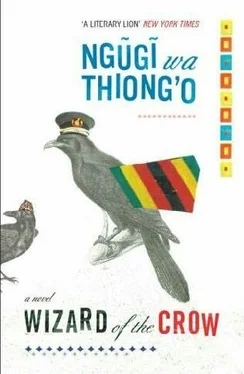The Ruler signaled satisfaction. Now before his ministers, he planned to rehearse his oral arguments, to their great delight and unabashed admiration. They clapped in appreciation for the privilege of a preview.
“Listen carefully, for I may use the same speech in my address to the United Nations General Assembly. Assume that you are now the directors of the Global Bank,” he told the ministers, “and even the United Nations General Assembly…”
The man’s unfathomable and indefatigable mind always intrigued them; they were now willing captives to what promised to be an incredible performance.
Rumor has it that the Ruler talked nonstop for seven nights and days, seven hours, seven minutes, and seven seconds. By then the ministers had clapped so hard, they felt numb and drowsy. Some did not realize that they themselves had become hoarse and were now producing barely audible whispers of more, give us more, couldn’t agree with the Mighty One more. Some could barely complete a sentence, then a word, then a syllable.
When they became too tired to stand, they started kneeling down before the Ruler, until the whole scene looked like an assembly in prayer before the eyes of the Lord. But soon they found that even holding their bodies erect while on their knees was equally tiring, and some assumed the cross-legged posture of a Buddhist. Others opted for the crouching posture of a Muslim at prayer, touching the floor with their foreheads and taking their time to lift their heads. A few, unable to lift their heads, pretended to be in continuous obeisance, with heads and hands on the floor and their buttocks in the air. In the end, each person tried any posture that gave his legs, neck, arms, and even lips some rest. The biographer lay flat on the floor, trying to write down everything the Ruler said; eventually he rested his head on one side of the book and somehow managed to continue scrawling notes for the book of life. By the seventh hour of the seventh day, the security men, who used a wall to prop themselves up, were some of the very few who remained on their feet. Among civilians, Machokali held out longest, but he, too, felt his knees about to buckle. Ever careful not to offend, he tried to approach the Ruler for permission to sit down, but found himself kneeling, groggily moaning, yes my lord, amen, anything, as if engaged in a call-and-response ritual with the Ruler.
That, it is said, was the scene that confronted three messengers- white, brown, and black-from the Global Bank when they arrived at the chamber at one o’clock on the seventh day. They did not show undue surprise, not when they saw the hideousness that was now the Ruler seated on the carpet, leaning against the wall, the ministers in the various praying postures, and, no, not even when they looked at the men and saw the agony of their haggard faces, because the visitors took this to be a native religious ritual.
They were Bank diplomats who had been trained to understand that money knew no religion, race, skin color, or gender; that money was the root of all money, the only constant law of the new global order. Still, they had been trained to be sensitive to the diversity of cultures, and so their only fear was intrusion, lest they hurt any nerves by intruding into a live religious rite. One of the diplomats looked around to see if there was anyone to whom he could offer apologies.
Fortunately for the visitors, they had entered the chamber at precisely the moment the Ruler had paused, as if the words stuck within him for weeks had all been used up and he was awaiting a fresh infusion. He saw them, and without making any effort to stand up he shouted, Welcome, welcome. On hearing the word welcome, the ministers forced themselves out of their different postures and dragged their bodies to get chairs for the visitors and for themselves, inwardly grateful to the Bank officials for interrupting seven days of fatigue, thirst, hunger, and lack of sleep.
The Ruler wasted no time; he asked his Minister of Finance and the Guardian of the National Treasury to summarize their deliberations on the role of Marching to Heaven in the economies of Aburiria, Africa, and the world at large, addressing all questions raised in the rejection letter from the Global Bank. But before the Minister of Finance could clear his tired throat and offer his precis, the Ruler had taken over and was riding high on a new wave of words.
The Bank diplomats grew restless and kept looking at their watches, but, as they still felt guilty for having interfered in a religious rite, out of politeness they waited for an opportune moment to say a word. After one hour, the messengers from the Bank looked at one another and at the ministers to see if there was anyone who could tell the Ruler to give them a chance to say what had actually brought them there. But no minister seemed ready to assume the responsibility.
The most senior of the three Bank officials now took it upon himself to get down to business. Excuse me, sir, he said, to no avail. He made a few more attempts, trying with difficulty to keep his voice level and his tone polite, but in the end he was forced to raise his voice considerably: Mr. President, sir! Mr. President, we bear an urgent message for you and are pressed for time because of other engagements.
The phrase urgent message did the trick, and the Ruler switched off. He beheld the briefcases in the hands of the three officials. These must contain the contract between the Global Bank and Aburiria. The sight of the briefcases also stirred life in the ministers. Hope was alive. The persuasive arguments of the Ruler must have moved these officials. So they all clapped in what looked like slow motion, and there was no way of telling if they were clapping out of relief that the flow of words had stopped or in anticipation of the good news in those briefcases.
“We have been sent to you because you had intimated that there was new information you wanted the Bank to take into consideration. But before we come to that, we have in our hands two reports concerning the present state of your country, and the Bank has a few questions regarding them.
“The first concerns your women. We have heard that Aburirian women have started beating up men. In our view, this is taking women’s liberation too literally and too far. Female violence to counter male violence is not the answer to domestic violence, and it poses a serious threat to family values, which, as we know them today, are the very foundation of a stable social environment.
“The second concerns this business of queuing. You told us, I believe, that you had put a stop to mass queuing. But we hear that there are people on motorcycles going around saying that you want the queues to resume, and that in some areas people are taking this call seriously. What, Mr. President, do you have to say on these two points?”
“What are you talking about?” the Ruler asked, puzzled, having forgotten all about the motorcycle riders, in fact slightly annoyed that they seemed to be more informed about his country than he was. “I am sure that the queuing nonsense is the work of a terrorist dissident movement. But what I don’t understand is your claim that men, true men, are allowing themselves to be beaten by women. Do these women want to become husbands, turning men into wives?” he said, trying to make light of the matter.
“That’s the point, Mr. President. Everything is upside down in your country. Your women are challenging the natural order of things, even setting up what they call people’s courts; and the queues challenge the social order. We don’t need to remind you of the obvious: if the masses take the law into their own hands, you will have nothing but chaos on yours. Extreme democracy. Direct democracy. The Greeks of old, in the city-state of Athens, I believe, tried it, and what happened? It brought down Greek civilization. Mr. President, go back to Aburlria. Put your house in order. Then send us a memorandum addressing anything new you wish us to consider. The Bank will review it thoroughly… but please excuse us. We have another appointment,” the Bank official said, glancing at his watch and, followed by the other two, also clutching their shiny briefcases, he went out, muttering under his breath, “Oh, damn, we are already late…”
Читать дальше












